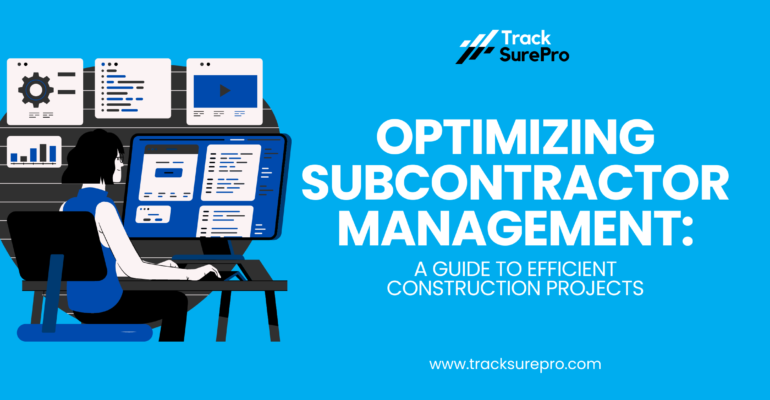Optimizing Subcontractor Management: A Guide to Efficient Construction Projects

Optimizing Subcontractor Management: A Guide to Efficient Construction Projects
Introduction:
Effective subcontractor management is essential for the success of construction projects, as subcontractors play a crucial role in various project activities. In this blog post, we will explore the importance of optimizing subcontractor management and provide a comprehensive guide to enhancing efficiency in construction projects through effective subcontractor management practices.
Understanding Subcontractor Management
Subcontractor management involves the coordination, communication, and supervision of subcontractors who perform specialized tasks or provide specific services within a construction project. From excavation and concrete work to electrical and plumbing installations, subcontractors contribute to various aspects of construction projects, making their effective management critical for project success.
Key Strategies for Optimizing Subcontractor Management:
- Prequalification and Selection Process:
- Before engaging subcontractors, it is essential to conduct a thorough prequalification process to assess their capabilities, experience, and qualifications. By selecting subcontractors who meet project requirements and standards, construction companies can minimize risks and ensure quality outcomes.
- Clear Contractual Agreements:
- Establishing clear contractual agreements with subcontractors is essential for defining project scope, deliverables, timelines, and payment terms. Clear contracts help mitigate misunderstandings, disputes, and delays, setting the foundation for successful collaboration and project execution.
- Effective Communication and Collaboration:
- Open and transparent communication is key to successful subcontractor management. Construction teams should establish regular communication channels and ensure that subcontractors receive clear instructions, updates, and feedback throughout the project lifecycle. Collaborative tools and platforms can facilitate real-time communication and collaboration, enhancing project coordination and efficiency.
- Healthy Indoor Environments:
- Monitoring subcontractor performance is crucial for identifying potential issues, addressing challenges, and ensuring adherence to project requirements. Construction teams should establish key performance indicators (KPIs) to measure subcontractor performance and conduct regular evaluations to identify areas for improvement and recognize outstanding performance.
- Risk Management and Contingency Planning:
- Proactively identifying and addressing potential risks associated with subcontractor activities is essential for minimizing project disruptions and delays. Construction teams should develop risk management plans, establish contingency measures, and monitor project progress to mitigate risks effectively and ensure project continuity.
How TrackSurePro Supports Subcontractor Management:
TrackSurePro provides construction companies with a robust subcontractor management platform designed to streamline subcontractor onboarding, communication, and performance monitoring. With features such as subcontractor prequalification, contract management, communication tools, performance tracking, and risk management capabilities, TrackSurePro empowers construction teams to optimize subcontractor management and enhance project efficiency. By centralizing subcontractor data, facilitating real-time communication and collaboration, and providing insights into subcontractor performance, TrackSurePro helps construction companies streamline subcontractor management processes and achieve project success.
Conclusion:
Optimizing subcontractor management is essential for maximizing efficiency and ensuring successful construction projects. By implementing key strategies such as prequalification and selection, clear contractual agreements, effective communication, performance monitoring, and risk management, construction companies can enhance subcontractor management practices and achieve project objectives. With the support of tools like TrackSurePro, construction teams can streamline subcontractor management processes, improve collaboration, and ultimately, deliver projects on time and within budget. By prioritizing effective subcontractor management, construction companies can drive project success and build long-term relationships with subcontractors for future projects.

